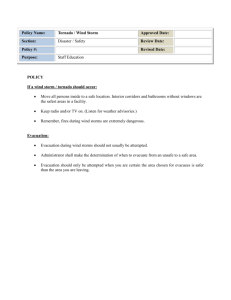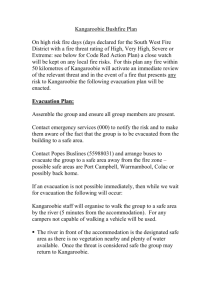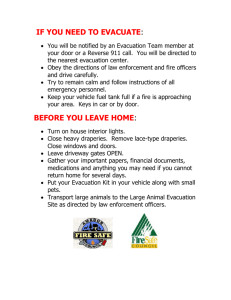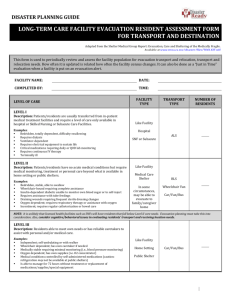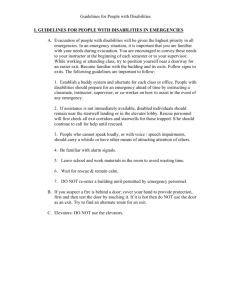availability of transport for emergency evacuations
advertisement
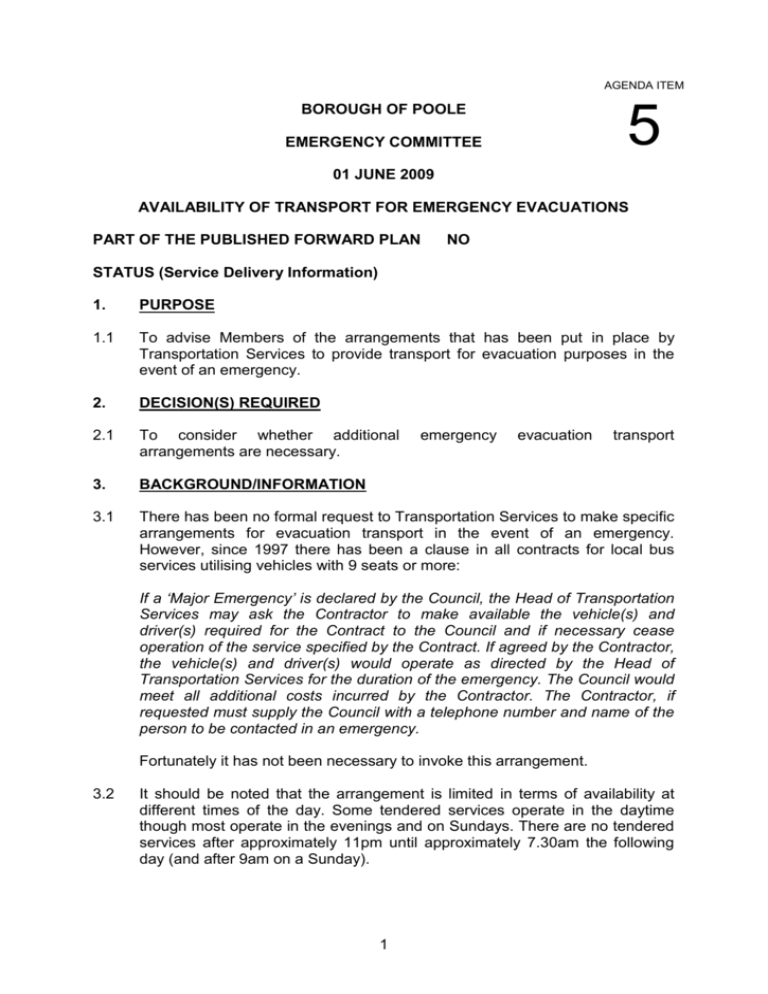
AGENDA ITEM 5 BOROUGH OF POOLE EMERGENCY COMMITTEE 01 JUNE 2009 AVAILABILITY OF TRANSPORT FOR EMERGENCY EVACUATIONS PART OF THE PUBLISHED FORWARD PLAN NO STATUS (Service Delivery Information) 1. PURPOSE 1.1 To advise Members of the arrangements that has been put in place by Transportation Services to provide transport for evacuation purposes in the event of an emergency. 2. DECISION(S) REQUIRED 2.1 To consider whether additional arrangements are necessary. 3. BACKGROUND/INFORMATION 3.1 There has been no formal request to Transportation Services to make specific arrangements for evacuation transport in the event of an emergency. However, since 1997 there has been a clause in all contracts for local bus services utilising vehicles with 9 seats or more: emergency evacuation transport If a ‘Major Emergency’ is declared by the Council, the Head of Transportation Services may ask the Contractor to make available the vehicle(s) and driver(s) required for the Contract to the Council and if necessary cease operation of the service specified by the Contract. If agreed by the Contractor, the vehicle(s) and driver(s) would operate as directed by the Head of Transportation Services for the duration of the emergency. The Council would meet all additional costs incurred by the Contractor. The Contractor, if requested must supply the Council with a telephone number and name of the person to be contacted in an emergency. Fortunately it has not been necessary to invoke this arrangement. 3.2 It should be noted that the arrangement is limited in terms of availability at different times of the day. Some tendered services operate in the daytime though most operate in the evenings and on Sundays. There are no tendered services after approximately 11pm until approximately 7.30am the following day (and after 9am on a Sunday). 1 3.3 The arrangement is also limited in terms of capacity for people with severe mobility problems. Whilst the majority (around 85%) of buses in Poole are now wheelchair accessible, they can only take one wheelchair at a time. 4. WHEELCHAIR ACCESSIBLE TRANSPORT 4.1 Borough of Poole operates an in-house fleet of 14 wheelchair accessible minibuses. These are principally used to provide Social Care transport, Special Needs School transport and Community Transport. The vehicles generally operate on Mondays to Fridays (excluding Bank Holidays) between approximately 8am and 6pm with a limited service on a Saturday daytime. 4.2 Whist there is no formal arrangement in place for use of the bus fleet for emergency evacuation purposes; they have been used in the past for this purpose. This includes the evacuation of a number of local residents to Hamworthy during a fire at a scrap yard on Alder Road and being on standby following a bomb scare close to Fourways. These incidents occurred during daytime hours. 4.3 There is no formal provision for the use of the fleet outside normal working hours. This is likely to be difficult to achieve with a small group of drivers. With the exception of Dorset Ambulance Service, there are very few other operators of wheelchair accessible vehicles in the borough. These tend to be more expensive than standard vehicles and their operation requires a broader set of skills. 5. TAXIS/PRIVATE HIRE VEHICLES 5.1 By their nature, taxis are generally available 24 hours a day, 7 days a week. However, there will be periods when availability could be limited due high demand or availability of drivers. Typically, taxis are busiest after 11pm and during the morning peak hours. 5.2 There are only 10 wheelchair accessible Hackney Carriage and 3 Private Hire vehicles (8 seats or less) licensed with the Borough. The Council has, in recent years, attempted to encourage the use of wheelchair accessible taxis by offering an additional Hackney Carriage plate per year and this is helping to increase the numbers. 6. FINANCIAL IMPLICATIONS 6.1 Any changes to the current arrangements are likely to have financial implications and would need to be costed. There is no provision from within Transportation Services budgets and any further measures would need to be considered from other Corporate/Emergency Planning budgets if made available. 2 7. LEGAL IMPLICATIONS 7.1 Any new transport arrangements would need to meet statutory requirements with regard to vehicles and drivers including licensing and drivers’ hours. 8. RISK MANAGEMENT IMPLICATIONS 8.1 Members of the Emergency Committee will need to consider with advice from the Emergency Planning Officer the risk of the current emergency transport evacuation arrangements being inadequate. 9. EQUALITIES IMPLICATIONS 9.1 It is essential that the needs of people with disabilities be fully taken into account with any new emergency transport evacuation arrangements. 10. CONCLUSIONS 10.1 Members are asked to consider, with advice from the Emergency Planning Officer, whether the current arrangements for emergency evacuation transport are adequate. Should they not be considered adequate Members are asked to consider what additional measures should be introduced and these may be investigated and costed for further consideration. Report Author: Julian McLaughlin, Head of Transportation Services Contact officer: John McVey, Passenger Transport & Accessibility Manager (Tel. 26 2221) Background Papers: None 3


